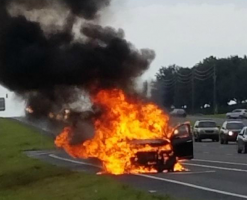
— A Hyundai engine recall includes Gamma, Nu and Theta II engines installed in 2015-2016 Hyundai Veloster, 2012 Santa Fe, 2011-2013 Sonata Hybrid and 2016 Hyundai Sonata Hybrid vehicles.
The Hyundai engine recall involves at least 128,000 vehicles at risk of fires when the connecting rod bearings prematurely wear out and cause engine damage.
A damaged connecting rod bearing can puncture the engine block and cause oil to leak onto hot surfaces. At the least an owner will have a vehicle with a damaged engine, and at the worst an owner will have a fire-ravaged car and possible injuries or deaths.
The Hyundai engine recall follows multiple actions over the years, including previous recalls, federal investigations, class action lawsuits and government penalties.
The Center for Auto Safety petitioned federal safety regulators in 2018 requesting an investigation into more than 100 Hyundai and Kia complaints about non-collision engine fires. In addition, more than 200 complaints said owners found smoke and burning odors caused by melted wires in the engine compartments.
The National Highway Traffic Safety Administration (NHTSA) granted the petition and opened a Hyundai Santa Fe and Sonata investigation in March 2019. At the time there had been reports of 1,300 fires and 26 injuries, and those were related to only the Sonata and Santa Fe.
NHTSA requested information from Hyundai about non-collision fires which occurred in all vehicles equipped with Theta II, Lambda II, Gamma and Nu engines. NHTSA also wanted information on any "thermal" events that possibly didn't reach the level of a "fire," such as reports of smoke or melted wires.
Why the Hyundai Engine Recall is Necessary
Hyundai told safety regulators that while certain recalled vehicles did have higher levels of non-collision fires, Hyundai's data "did not indicate elevated or unusual rates of non-collision related fires in Hyundai vehicles."
However, both NHTSA and Hyundai agreed the recalled vehicles did have issues:
The vehicles 'appeared to have experienced above average rates of hole-in-block engine fires that ordinarily result from a seized engine that causes a connecting rod to break, puncture the engine block, and thereby potentially allow engine oil to escape the block, come in contact with other hot surfaces in the engine compartment, and produce localized smoke and then fire in the engine compartment.' - Hyundai
As for why the connecting rod bearings prematurely wear out?
"Seized engines in this context most often result from manufacturing variances in terms of machined surface roughness, machining debris, and geometric fit among the crankshaft, connecting rod, and engine bearing components." - Hyundai
A Hyundai owner may notice one or more signs of engine problems.
- Abnormal knocking noise
- Reduced power or a hesitating engine
- Illumination of the check engine warning light
- Illumination of the engine oil pressure warning light
- Burning smells, oil leaks or smoke coming from the engine compartment
If technicians find evidence of bearing damage the engine will have to be replaced. All vehicles will also receive software updates which provide knock sensor detection systems. Hyundai has offered free knock sensor technology since at least January 2019 which monitors engine vibrations to indicate if a connecting rod bearing is damaged.
“When consumers are telling their car company and their government their cars are catching on fire, it should not require a third-party watchdog to force life-saving action, but that’s exactly what happened here. Far too many Hyundai owners had their horror stories dismissed as freak occurrences or anomalous. Today’s recall demonstrates that where there’s smoke there’s fire.” - Jason Levine, executive director of the Center for Auto Safety
The Hyundai Veloster, Santa Fe and Sonata Hybrid engine recall is expected to begin January 22, 2021.
Hyundai owners with concerns about the engine recall may call 855-371-9460. Hyundai's recall reference number is 198.
As for Kia owners, about 294,000 vehicles are recalled for engine troubles.




